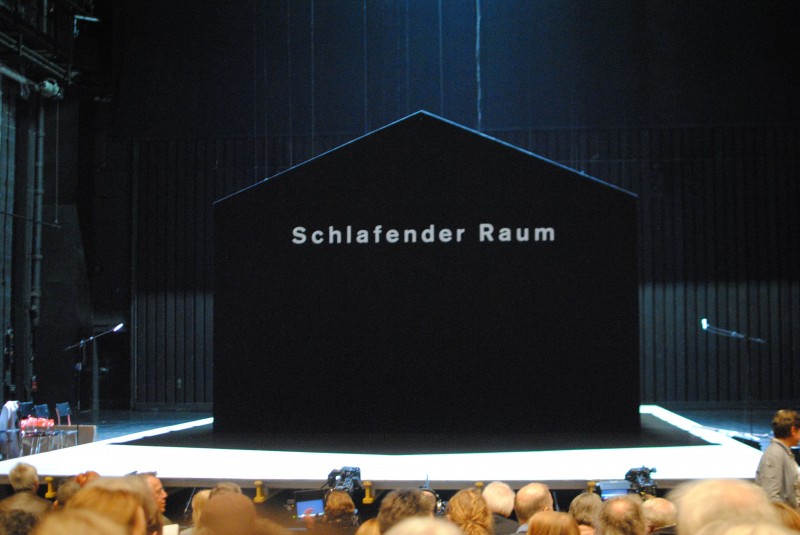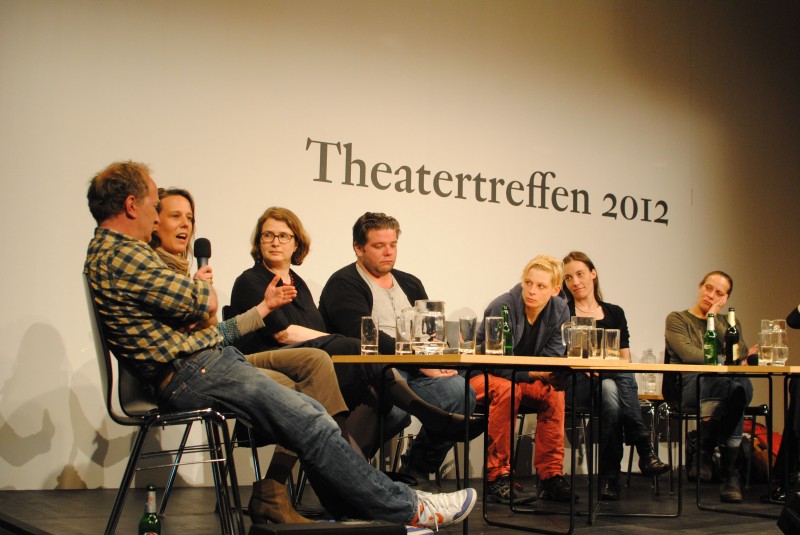“I have lost all hope,” announced Stefan Merki as Macduff, three quarters of the way through Karin Henkel’s Macbeth. “Me too,” came the indignant response from a voice from the row behind me. Whilst not a fan of attention-seeking audience members, I was inclined to agree at this point. Witches dressed in diamante-studded figure-skating outfits, Macbeth and Banquo singing to each other, and an empty, generic house-shaped set proclaiming itself to be the “sleeping room” (Schlafender Raum), all were not completely without interest, but they left me cold. It seemed I wasn’t alone; a few soft boos accompanied the applause at the end of the show.

The Sleeping Room, Photo: Miriam Sherwood
So all signs were pointing towards an exciting post-show audience discussion – after all, often it’s not the actors who deserve the booing. Sure enough, quite a number of audience members stayed to hear the director and set designer, as well as the cast, take part in the discussion, but many didn’t seem to want to commit to a Macbeth Part 2, choosing instead to linger on the side and leave around half the seats empty.
Things continued in this half-hearted vein. For one, it could hardly be described as an audience discussion: rather than opening for questions from the start, host Tobi Müller for the first half hour asked his own questions regarding the role of the “sleeping room,” the function of the witches, and the already much-debated gender-bending aspects of the production. Jana Schulz was prompted for the umpteenth time to explain that she didn’t approach the role of Macbeth in terms of gender, from a woman’s perspective, but in terms of the character, from a human being’s perspective.
Nevertheless, Henkel added that she did see the playing with gender roles as an important theme in the production, reflecting not only the imagery in Shakespeare’s original (“unsex me here” says Lady Macbeth, for instance, and she asks her husband “Are you a man?”) but also highlighting the idea of confusion and disorder in the play – “fair is foul and foul is fair” was her motto.

Director Karin Henkel answers, Photo: Nadine Loes
When the audience finally did get the chance to ask their own questions, it seemed that there wasn’t enough time to properly answer them. Particularly those interested in how the dialogue between director and stage designer worked in the early stages of the production were left pretty much none the wiser.
Henkel did provide an insight into the decision to have the actors speak in their own languages as well as in German. Not only did it make the most of the cast’s international roots, it was simply a useful means of delineating the many different roles that all the actors (barring Schulz) were playing.
After one audience member announced that the style of the production (light-hearted and energetic) contradicted everything the script called for (war and bloodlust), actor Benny Claessens replied that the play wasn’t just about butchery, and that it was high time for a smoke in the Theatertreffen garden. Discussion closed and time for bed.
